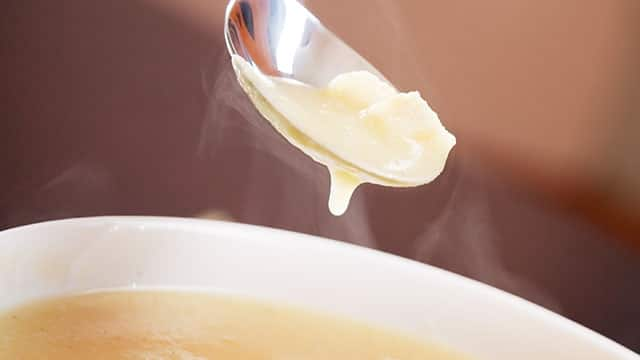-
-

FLUORIDE
What Is Stannous Fluoride Toothpaste?Discover what is Stannous Fluoride Toothpaste and its importance to prevent cavities and other oral health problems.

TEETH WHITENING
Whitening toothpaste - hydrogen peroxide vs. carbamide peroxideIf you lose one or more of your front teeth due to injury or decay, you may feel ...
-
Science & InnovationOral Health Commitment
- Oral Health Commitment
- Bright Smiles, Bright Futures
- Educational Resources
- Mobile Dental Van
- Volunteer
- ORAL HEALTH CHECK
- PRODUCT MATCH
- Oral Health and Dental Care | Colgate®
- Oral Health
- Why Should We Eat Food Slowly & Chew Properly


When you dig into your dinner or nosh on a post-workout snack, you're probably focused on satisfying your cravings and fueling your body. But whether you're indulging in a treat or eating healthy, the way you chew might be affecting your overall enjoyment of a meal. Chewing food might seem simple and instinctive, but how you chew may impact your oral and gut health. Learn more about how and why to chew correctly, and you'll probably relish your food even more.
The Purpose of Chewing
Since the dawn of time, chewing has been the primary way of breaking down food into smaller, more digestible particles that can easily pass through the digestive tract. Of course, different foods take a different amount of chewing to break down, and early hominids likely used their teeth to grind down plants and breakthrough tough meat sources. Today, most foods are tender enough to be pulverized with a moderate amount of chewing, but there's still something to be said for taking your time to chew slowly and mindfully.
Here are some of the benefits of prolonged and thorough chewing your food:
- Chewing helps to signal the beginning of the digestive process. As your body releases saliva to help break down food, it also relaxes the stomach ahead of digestion to allow food and nutrients to pass through more easily.
- Chewing food slowly gives the stomach enough time to signal the brain for satiety. Chewing food slowly actually reduces food intake between meals, meaning it can be a great tip to help you curb overeating and increase your satisfaction at mealtimes.
- When food particles are left on the teeth, they provide fuel for bacteria that can cause tooth decay. Prolonged and thorough chewing produces more saliva, which helps remineralize teeth and restore your mouth's pH after eating acids and sugars.
How to Chew Food Properly
There's no perfect way to chew your food, as factors like the type of food and the condition of your teeth can affect how you break down what you eat. There are, however, some guidelines to make sure your food has been properly chewed before you swallow. You might, for instance, choose a goal of "chews" to hit before you swallow, such as 20. You can also make sure your food is completely pulverized before you swallow and begin digesting.
If you tend to eat too quickly (and chew too fast), you can set some rules for eating to help you do so more mindfully. Only eat at prescribed times and while sitting at a table. Make sure you avoid other activities when eating instead of taking the time to focus on your food and your satiety level. Then, always brush after meals to clean away leftover food particles.
Chewing your food might seem like a no-brainer, but the way you eat can contribute a lot to your overall health. Take time to slow down, eat mindfully and chew slowly, and you could find you eat less and enjoy your food even more.
Oral Care Center articles are reviewed by an oral health medical professional. This information is for educational purposes only. This content is not intended to be a substitute for professional medical advice, diagnosis or treatment. Always seek the advice of your dentist, physician or other qualified healthcare provider.
Related Articles

Nutrition and oral health
Loss of Taste: Causes and TreatmentsFood lacking flavor these days? Here's what could be disrupting your ability to taste and what you can do about loss of taste. Learn more, here.

Nutrition and oral health
Is Popcorn Bad For Your Teeth?Is popcorn bad for your teeth? Here's what you need to know about how this popular snack can affect your dental health.

Nutrition and oral health
Soft Food Diet Options: What To Eat After Dental TreatmentA soft food diet is required after certain dental procedures, like extractions and implants, to prevent damage to your teeth, mouth or new prosthetic.

Nutrition and oral health
Does Taking Vitamin K2 Benefit Your Oral Health?You are what you eat, and the vitamins you include your diet can benefit your overall health. Here's what to know about vitamin K2 benefits.
Related Products

Esse enxaguante bucal multibenefício Colgate Total 12 Carvão Ativado apoia as defesas naturais da sua boca com o zinco. Ele também ajuda a manter os dentes mais brancos, além de combater germes e bactérias para uma limpeza total por até 12 horas.

Colgate Total Alcohol Free* Gum Health Mouthwash delivers 24-hour protection** against bacteria and also helps prevent gum problems

Colgate Total Fresh Mint Toothpaste fights bacteria, the root cause of many oral health issues such as gingivitis, tartar, sensitivity, weak enamel, bad breath, and cavities.

Formulated with Fluoride and with a great mint taste, Colgate Cavity Protection Toothpaste cleans thoroughly, strengthens teeth, and fights cavities.

Helping dental professionals
More professionals across the world trust Colgate. Find resources, products, and information to give your patients a healthier future




